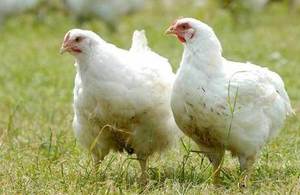Poultry gatherings suspended following avian flu case
Further measures announced to reduce the risk of avian flu spreading

Read avian influenza (bird flu) in winter 2016 to 2017 or avian influenza (bird flu) detailed guidance for the latest information.
A temporary suspension on gatherings of some species of birds will apply across England, Scotland and Wales from today (Tuesday) following a case of highly pathogenic avian flu of the H5N8 strain at a farm in Lincolnshire.
The ban on gatherings applies to birds at higher risk of avian flu including chickens, turkeys, ducks and geese, and restricts events such as livestock fairs, auctions and bird shows.
Since the disease was declared on 16 December it has now been confirmed all 2,500 birds at the farm have been destroyed, the farm has been disinfected and there have been no subsequent cases reported, though restrictions around the site remain in place.
The ban is part of the Government’s robust measures to tackle the disease and reduce the risk of the virus spreading, which includes a requirement to keep all poultry and captive birds housed or otherwise separated from contact with wild birds and advice urging farmers and poultry keepers to ensure strict biosecurity standards.
The ban on gatherings does not apply to pigeons or aviary birds which are at much lower risk of passing the disease to domestic poultry. It will be kept under review and may be lifted or amended if the risk level changes.
Advice from Public Health England remains that the risk to public health from the virus is very low. The Food Standards Agency has also made clear bird flu does not pose a food safety risk for UK consumers. There is not anticipated to be any impact on the supplies of turkeys or other birds over Christmas.
Chief Veterinary Officer, Nigel Gibbens, said:
While we have seen no further cases of bird flu following the outbreak in Lincolnshire, we must continue to be vigilant and do all we can to protect against this highly pathogenic strain of the disease.
This ban on gatherings is a proportionate step that will help protect our farmers and bird keepers from seeing their flocks infected with this disease that can have a devastating impact on poultry.
The risk to human health continues to be very low and there is no impact on the food chain, but infection at a gathering could lead to rapid dispersal of infection to kept birds in many locations.
Our Avian Influenza Prevention Zone remains in place across the country and anyone who has regular contact with birds should stay alert for signs of disease, maintain the highest biosecurity standards and take all reasonable steps to minimise contact between poultry and wild birds.
Bird keepers should report suspected disease immediately and must maintain high biosecurity standards by:
• reducing the movement of people, vehicles or equipment to and from areas where poultry or captive birds are kept
• taking precautions to avoid the transfer of contamination by cleansing and disinfection of equipment, vehicles and footwear
• making sure that feed and water can’t be accessed by wild birds
• implementing effective vermin control programmes around buildings where poultry or captive birds are kept
Avian flu of the H5N8 strain was confirmed in turkeys at a farm near Louth in Lincolnshire on 16 December. Most birds at the premises died soon after contracting the disease and any remaining have now been humanely culled. A 3km Protection Zone and a 10km Surveillance Zone are in place around the infected farm to limit the risk of the disease spreading.
Background
-
The ban on gatherings of chickens, turkeys, ducks and geese applies in England, Scotland and Wales. More information on what gatherings are affected
-
Restrictions remain in place requiring all poultry and captive birds across Great Britain to be housed to prevent the spread of avian flu.
-
An outbreak of avian flu was confirmed on a farm in East Lindsey, Lincolnshire on December 16.
-
For further advice on avian influenza contact the Defra Helpline on 03459 33 55 77. For media queries contact Defra press office on 020 8225 7618 or out of hours on 0345 051 8486.